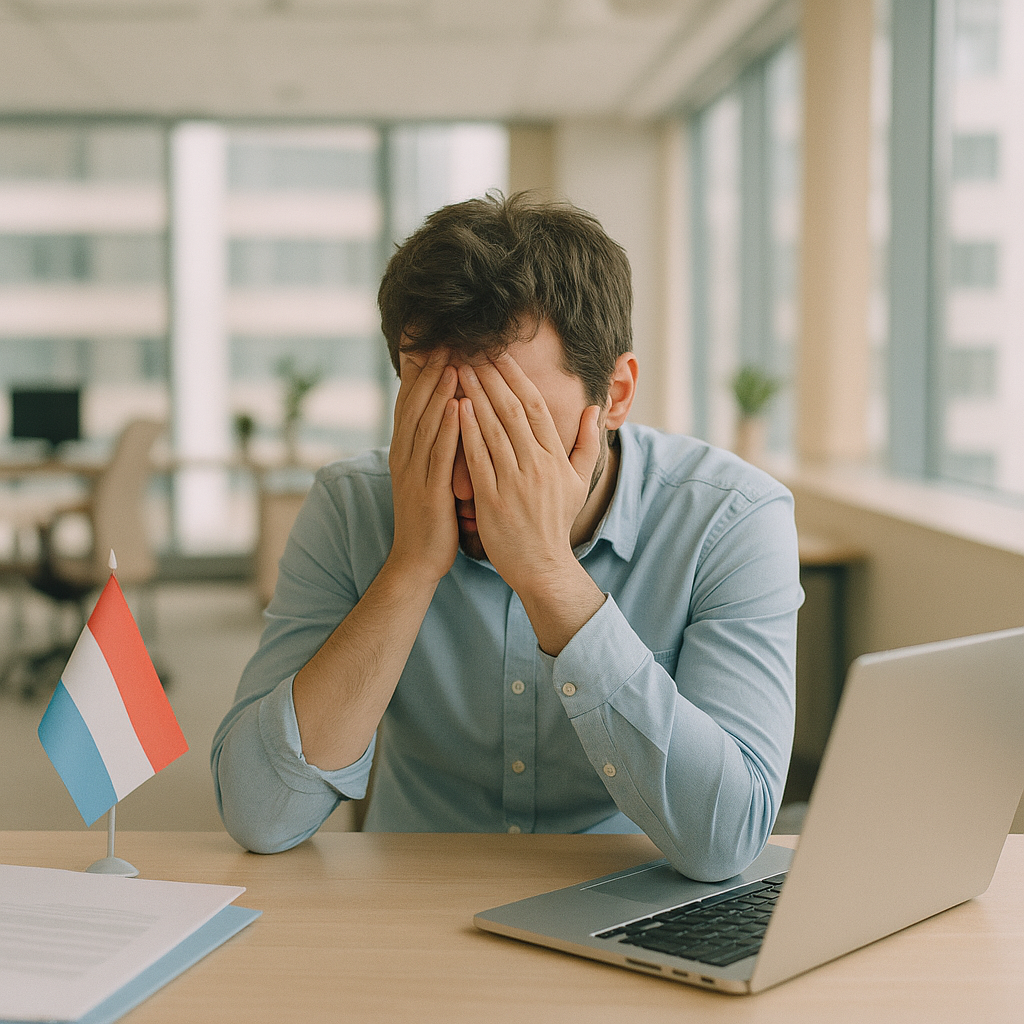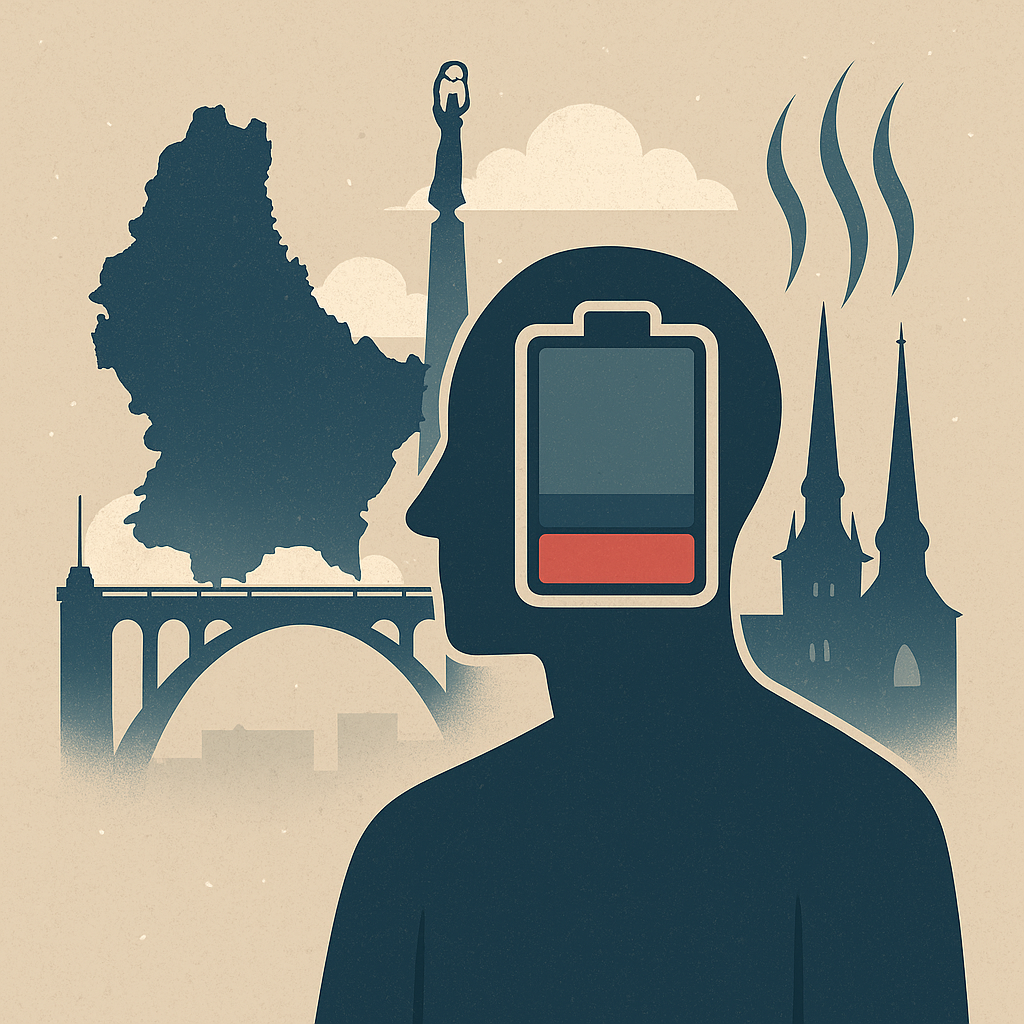
Burnout in Luxembourg has emerged as a significant and growing concern for employees and employers alike across the Grand Duchy. This condition, far more profound than simple tiredness, represents a state of chronic physical and mental exhaustion caused by prolonged, unmanaged workplace stress, often leading to severe consequences on mental health and professional exhaustion syndrome, commonly referred to as burn out Luxembourg. The World Health Organization (WHO) classifies burnout as an occupational phenomenon, highlighting its roots in the workplace environment. Its impact on mental health, overall well being, physical health, and private life is substantial, often leading to decreased productivity and significant challenges for both the employee and the organization. Addressing this escalating problem requires a deep understanding of its symptoms, multifaceted causes, available treatment options, and, crucially, effective prevention strategies within the Luxembourg context.
Burn Out Luxembourg is not only detrimental to individual employees but also impacts overall organizational health.
In the context of Burn Out Luxembourg, employers must take proactive steps to mitigate risk factors.
Understanding Burn Out Luxembourg is essential for effective workplace management.
Burn Out Luxembourg has become a critical issue for many workers, highlighting the need for awareness and action.
Introduction
To combat Burn Out Luxembourg, it’s important to look out for early warning signs.
Those facing Burn Out Luxembourg often experience overwhelming emotional and physical exhaustion.
Symptoms of Burn Out Luxembourg include persistent tiredness and various physical complaints.
Sick leave in Luxembourg is a vital aspect of the country’s social security system, providing employees with the necessary time to recover from illnesses or injuries while receiving financial compensation. The Grand Duchy of Luxembourg has implemented a comprehensive framework to regulate sick leave, ensuring that both employees and employers are aware of their rights and obligations. This framework is essential in maintaining the health and well-being of the workforce, allowing employees to take the time they need to recover without the added stress of financial instability. In this section, we will delve into the intricacies of sick leave in Luxembourg, exploring the legal framework, economic aspects, medical considerations, international aspects, and working conditions that govern this essential benefit.

Understanding Burnout: What Are the Key Symptoms?
Identifying burnout early is vital, yet challenging, as its onset is gradual. Recognizing the warning signs allows for timely intervention before the condition becomes debilitating. Burnout typically manifests across three core dimensions:
1. Overwhelming Emotional and Physical Exhaustion
This is often the most prominent and initial symptom. The affected person feels utterly drained, lacking the energy for daily tasks, both at work and home. This isn’t ordinary fatigue; it’s a profound sense of depletion that rest alone doesn’t alleviate. Common manifestations include:
Combating Burn Out Luxembourg requires recognizing emotional detachment from work.
Burn Out Luxembourg can lead to cynicism and negativity towards work and colleagues.
- Persistent tiredness, feeling depleted most of the time.
- Physical complaints like headaches, muscle pain (especially back pain), and gastrointestinal issues.
- Sleep disorders, such as insomnia or difficulty getting enough sleep.
- Increased susceptibility to common illnesses due to a weakened immune system, making it easier to fall ill.
This emotional exhaustion can make even simple tasks feel overwhelming.
Addressing Burn Out Luxembourg involves improving workplace relationships.
2. Cynicism, Negativity, and Emotional Detachment
A growing sense of emotional detachment from one’s job is a hallmark sign. The person may develop a cynical or overly negative attitude towards their work, colleagues, clients, or the organisation itself. This can manifest as:
Burn Out Luxembourg significantly affects professional efficacy and personal confidence.
- Loss of enjoyment and enthusiasm for work previously found meaningful.
- Irritability and impatience with colleagues or clients.
- Feeling disconnected from the workplace environment.
- A tendency to isolate oneself and withdraw from social interactions at work.This cynicism represents a psychological coping mechanism to distance oneself from the source of stress.
3. Reduced Professional Efficacy and Sense of Accomplishment
Burnout erodes a person‘s belief in their own competence and ability to perform their job effectively. Despite potentially long hours and significant effort, individuals feel inefficient and unproductive. Key indicators include:
- Pervasive self-doubt regarding skills and capabilities.
- Difficulty concentrating and memory problems.
- Feeling ineffective and that one’s contributions don’t matter.
- A sense of failure and loss of confidence, potentially leading to poor work performance.Other associated symptoms frequently include heightened anxiety, persistent worry, and sometimes clear signs of clinical depression.
Exploring the Causes: Why is Burnout Prevalent in Luxembourg?

Recognizing the complexity of Burn Out Luxembourg helps frame prevention strategies.
The development of burnout is rarely attributable to a single cause. In Luxembourg, a combination of workplace factors and broader contextual pressures contributes to the risk:
Burn Out Luxembourg results from multiple factors, emphasizing the need for comprehensive solutions.
- Excessive Workload and Sustained Pressure: Unmanageable workloads, consistently tight deadlines, and a high-intensity work pace are primary drivers of stress.
- Lack of Control and Autonomy: Feeling powerless over one’s tasks, schedule, workload, or key decisions significantly increases stress levels for employees.
- Insufficient Recognition and Reward: A lack of appreciation, acknowledgement, or fair compensation for effort and achievements is highly demotivating and a major burnout risk factor.
- Problematic Workplace Relationships: Toxic work environments, unresolved conflicts, lack of support from management or colleagues, bullying, or harassment severely impact mental health.
- Poor Work-Life Balance: The inability to disconnect from work, excessive overtime, work consistently encroaching on family and private life, and the burden of long commutes (a significant issue for many cross border workers in Luxembourg) disrupt the necessary balance.
- Specific Luxembourg Context: The high cost of living creates financial stress, while certain sectors (like the financial sector, healthcare, and education) face intense pressure. The demands of a multilingual workplace can also add cognitive load.
High workloads are a key contributor to Burn Out Luxembourg.
In different countries, such as Belgium and France, burnout is recognized as a legitimate disease, impacting sick leave policies. In contrast, Luxembourg does not officially recognize burnout, leading to differences in how workplace stress and health conditions are managed across various countries.
Burn Out Luxembourg is exacerbated by a lack of recognition and reward in the workplace.
Employees facing Burn Out Luxembourg may struggle with poor work-life balance.
Understanding Burn Out Luxembourg’s specific context is crucial for effective management.
Legal Framework
The legal framework governing sick leave in Luxembourg is established by the National Health Fund (CNS) and the Labour Code. Employees are entitled to sick leave if they are unable to work due to illness or injury, and they must provide a medical certificate justifying their absence. The employer is responsible for paying the employee’s salary during the initial sick leave period, which can last up to 77 days. After this period, the CNS takes over the payment of sick leave benefits. Public sector employees, on the other hand, are entitled to continued remuneration for the entire period of their sick leave. It is essential for employees to understand their rights and obligations regarding sick leave, including the requirement to notify their employer and the CNS of their absence and to provide a medical certificate. This ensures that the process is transparent and that employees receive the support they need during their recovery.
Legal frameworks surrounding Burn Out Luxembourg must adapt to current workplace realities.
Economic Aspects
Economic implications of Burn Out Luxembourg can be significant for both employees and employers.
The economic aspects of sick leave in Luxembourg are significant, as the National Health Fund (CNS) plays a crucial role in providing financial compensation to employees during their sick leave period. The CNS is responsible for paying sick leave benefits to employees who have exceeded the 77-day limit, ensuring that they continue to receive a portion of their salary. Employers, on the other hand, are responsible for paying their employees’ salaries during the initial sick leave period. The economic impact of sick leave on businesses can be substantial, highlighting the importance of implementing measures to prevent and manage sick leave effectively. By providing economic compensation to employees, the CNS helps to mitigate the financial burden of sick leave on both employees and employers, ensuring that the workforce remains supported during times of illness.
Burn Out Luxembourg creates profound consequences for both individuals and organizations.
The Impact of Burnout: Consequences for Individuals and Organisations
Addressing Burn Out Luxembourg through medical considerations is vital for recovery.
The repercussions of burnout are far-reaching. For the individual employee, it can lead to serious mental health problems (depression, anxiety disorders), physical health deterioration, relationship breakdowns, and social isolation. For the employer, the costs manifest as increased absenteeism (sick leave), higher staff turnover, reduced productivity, errors, and a decline in overall morale. Addressing burnout is therefore not just an ethical imperative but also an economic necessity.
Medical Considerations
Recognizing Burn Out Luxembourg can lead to more effective management and support.
Medical considerations play a vital role in the sick leave process in Luxembourg. A medical certificate is required to justify an employee’s absence, and it must be provided by a licensed doctor. The medical certificate must indicate the employee’s inability to work and the expected duration of their sick leave. In some cases, a gradual return to work may be necessary, and this must be approved by the treating physician. Employees who are experiencing mental health issues, such as burnout or depression, may require specialized care and support. The CNS and employers must work together to ensure that employees receive the necessary medical attention and support during their sick leave period. It is also essential for employees to prioritize their well-being, including getting enough sleep, eating a healthy diet, and engaging in regular exercise. These practices can significantly aid in recovery and help prevent future illnesses.

Navigating Burnout: Management, Support, and Sick Leave in Luxembourg
Effective management and recovery from burnout require time, understanding, and access to appropriate support and resources. The process often involves taking sick leave to recuperate.
Understanding Sick Leave Procedures
When an employee is unable to work due to illness, including severe burnout symptoms, specific procedures must be followed in Luxembourg:
- Notification: The employee must inform their employer (orally or in writing) on the very first day of their absence.
- Medical Certificate: If the absence lasts longer than two working days, a medical certificate is required. This certificate must be issued by a doctor (often the family doctor or treating physician) and submitted to both the employer and the National Health Fund (CNS – Caisse Nationale de Santé) by the end of the third day of sick leave. Specific rules apply for cross border workers obtaining certificates abroad. The medical certificate justifying the absence is crucial, as doctors play a critical role in evaluating an employee’s health condition and determining if time off work is necessary.
- Continued Remuneration: The employer is obligated to continue paying the employee’s full salary during the initial sick leave period. This continued remuneration lasts until the end of the calendar month in which the 77th day of incapacity falls, calculated over a reference period of 18 consecutive months.
- CNS Benefits: After the employer‘s obligation ends, the National Health Fund (CNS) provides economic compensation in the form of sickness benefits (indemnités pécuniaires). The total duration for receiving these benefits is capped at 78 weeks within a 104-working week reference period.
Burnout and Sick Leave Status
Crucially, burnout itself is not officially classified as an occupational illness in Luxembourg‘s social security system. Therefore, a medical certificate justifying sick leave due to burnout will typically cite associated diagnosable symptoms such as severe emotional exhaustion, mental exhaustion, depression, or anxiety disorders that render the employee unfit for work.
Additionally, the CNS grants stays abroad based on recommendations from treating physicians for individuals with a stabilized illness within the framework of a disability procedure.
Rules During Sick Leave
The CNS enforces rules regarding authorised outings during sick leave:
- First 5 Days: Outings are generally prohibited, except for necessary medical appointments (e.g., a visit to the doctor) or checks by the Social Security Medical Control (CMSS).
- From Day 6: If the treating physician has explicitly authorised outings on the medical certificate, the employee may leave home between 10:00-12:00 and 14:00-18:00.
- Prohibited Activities: Engaging in any activity incompatible with the stated health condition, including most sports activities (unless medically prescribed), or frequenting bars/restaurants (except to eat a meal, requiring prior CNS notification) is forbidden during the entire period of sick leave. CNS control measures (unannounced home checks) can occur.
- Stay Abroad: A stay abroad during sick leave generally requires prior authorization from the CNS, except in specific following cases like serious illness or death abroad of a close relative.
- Derogation: For sick leave lasting at least one month, employees can request a derogation from the strict outing rules from the CNS.
- Full Name Requirement: If an employee cannot stay at their own home during their sick leave, they must indicate the full name of the person with whom they will be staying, as mandated by the CNS.
These restrictive rules can sometimes pose challenges for burnout****recovery, which may benefit from gradual activity rather than complete confinement.
Progressive Return to Work
After a period of sick leave, a progressive return or gradual return to work may be recommended by the treating physician and agreed upon with the employer and CNS. This allows the employee to ease back into their duties, often starting with reduced hours or modified tasks, which can be crucial for sustainable recovery and preventing relapse. This requires a new medical certificate specifying the terms of the gradual return. If an employee falls sick during their vacation, they are entitled to reschedule the equivalent number of vacation days to a later date.
International Aspects
Luxembourg’s unique position as a cross-border country means that international aspects of sick leave must be considered. Cross-border workers who are employed in Luxembourg but reside in another country may be subject to different rules and regulations regarding sick leave. The CNS and employers must be aware of these differences and ensure that cross-border workers receive the necessary support and compensation during their sick leave period. International cooperation and agreements, such as the European Union’s social security coordination regulations, play a crucial role in ensuring that employees’ rights are protected across borders. This ensures that all workers, regardless of their country of residence, are treated fairly and receive the benefits they are entitled to.
Working Conditions
Working conditions in Luxembourg can have a significant impact on employees’ mental and physical health, leading to sick leave. Factors such as poor work-life balance, excessive workload, and lack of recognition can contribute to burnout and other mental health issues. Employers have a responsibility to provide a healthy and safe working environment, including implementing measures to prevent and manage stress. The ASTF Director, Patrizia Thiry, emphasizes the importance of addressing mental health issues in the workplace, including providing training courses and support for employees. By prioritizing employees’ well-being and providing a positive working environment, employers can help to reduce the incidence of sick leave and promote a healthy and productive workforce. This proactive approach not only benefits the employees but also enhances overall organizational performance and morale.
Finding Support: Resources for Employees in Luxembourg
Seeking help is an essential step towards recovery. Fortunately, various resources are available:
- General Practitioner / Family Doctor: The first point of contact. They can assess symptoms, provide a medical certificate, offer initial advice, and refer to specialists.
- Psychologists / Psychotherapists: Offer talking therapies crucial for understanding the root causes of burnout, managing stress, processing emotional difficulties, and building resilience. Finding the right professional help is key.
- Psychiatrists: Can diagnose and treat co-occurring mental health conditions like severe depression or anxiety disorders, potentially prescribing medication.
- Professional Coaches: Can assist with developing coping strategies, improving work life balance, setting boundaries, and career planning.
- Occupational Health Services (ASTF, STM, etc.): Mandatory services provided via the employer. They play a role in prevention, health surveillance, and advising on workplace adjustments, potentially supporting a gradual return to work.
- CSL Stressberodunghttps://www.csl.lu/en/health-well-being-and-security-at-work/stressberodung/: A free, confidential consultation service offered by the Chamber of Employees (Chambre des Salariés) for any employee experiencing workplace stress, burnout, or harassment.
- Luxembourg League for Mental Hygiene (LLHM): Provides information, prevention initiatives, training courses, and mental health support services.
- APGS (Association Prévention et Gestion du Stress): Runs professionally facilitated support groups specifically for individuals dealing with depression and/or burnout.
- ASTF (Association pour la Santé au Travail des Secteurs Tertiaire et Financier): Offers comprehensive programs like “Lighthouse” specifically for burnout****management and recovery, primarily for employees in the tertiary and financial sector. ASTF Director Patrizia Thiry often highlights the importance of early intervention.
- Family-Related Leave for Sick Child: Parents in Luxembourg can apply for family-related leave to take care of a sick child. The eligibility and regulations depend on the child’s age, and specific rules are in place to guide parents through the application process.
It’s vital for employees experiencing burnout symptoms not to suffer in silence but to reach out to their doctor or one of these support structures.
Prevention Strategies: A Shared Responsibility
Preventing burnout is far more effective than treating it. This requires proactive efforts from both the employee and the employer.
Individual Strategies for Employees:
- Prioritize Self-Care: Ensure enough sleep, maintain a healthy diet, engage in regular physical activity, and pursue hobbies that bring joy and relaxation.
- Set Boundaries: Clearly define work hours and disconnect outside of them. Learn to say “no” to excessive demands. Protect personal time with family and friends.
- Manage Stress: Practice stress-reduction techniques like mindfulness, meditation, or deep breathing exercises.
- Seek Support: Maintain strong social connections. Talk about work pressures with trusted friends, family, or colleagues. Utilize professional help when needed.
- Take Breaks: Use vacation time for genuine rest and take short breaks during the workday.
Organizational Strategies for Employers:
- Foster a Healthy Workplace Culture: Promote respect, open communication, and psychological safety. Address toxic behaviors like harassment promptly. Encourage teamwork and peer support. Mental health must be a priority.
- Ensure Reasonable Workloads: Distribute tasks fairly and set realistic deadlines. Avoid a culture of excessive overtime. Provide clarity on roles and responsibilities.
- Provide Control and Autonomy: Empower employees by giving them more say in how they perform their work where possible.
- Offer Recognition: Regularly acknowledge and appreciate employees‘ efforts and contributions. Ensure fair compensation and benefits.
- Promote Work-Life Balance: Support flexible working arrangements where feasible. Respect boundaries regarding working hours and disconnection. Encourage employees to take leave. Leaders should model healthy habits.
- Provide Resources: Offer training courses on stress management, resilience, or time management. Ensure access to confidential support like EAPs or occupational health services. Train managers to recognize stress and support their teams’ well being.
- Systematic Risk Management: Implement robust processes for identifying, assessing, and mitigating psychosocial risks in the workplace, involving employee participation.
- Support Return to Work: Implement supportive protocols for employees returning after sick leave, facilitating a gradual return.
- Parental Leave for Family Reasons: Both parents have the right to apply for leave for family reasons if they have a child under 18. This leave can be taken under specific conditions, and it is important to consider the implications for single versus dual-income households.
The Role of Neurofeedback in Burnout Recovery

Emerging approaches like Neurofeedback offer innovative support for burnout****recovery. This brain training technique helps individuals improve self-regulation of brain activity, potentially alleviating persistent symptoms like concentration issues, mental exhaustion, sleep disorders, and anxiety.
The process typically starts with a quantitative EEG (qEEG) or “Brainmap” to identify specific brainwave patterns linked to chronic stress. Based on this, personalized Neurofeedback training sessions provide real-time feedback, guiding the brain towards more balanced and efficient functioning. Complementary neuromodulation techniques, such as Photobiomodulation (using light therapy), can further support brain health, reduce inflammation, and enhance cognitive function and mood, aiding the recovery and adaptation process. These techniques act directly on the brain mechanisms impacted by chronic stress and can be a valuable addition to traditional therapies and lifestyle adjustments.
In addition to these innovative approaches, it is crucial for a patient to follow the necessary procedural steps during sick leave. This includes obtaining medical certificates and adhering to the guidelines set by their employer and the National Health Fund (CNS) to ensure proper health management and compensation.
Learn more about quantitative EEG (Brainmap)
Discover Neurofeedback training
Conclusion: Building a Healthier Working World in Luxembourg
Burnout is a complex and serious problem impacting countless employees and workplaces across Luxembourg. While individual coping strategies and treatment options, including innovative approaches like Neurofeedback, are essential, the most sustainable solution lies in robust prevention measures and fundamental improvements to working conditions. Creating a healthier professional environment requires collaboration between companies, employees, health professionals, and public authorities. Prioritizing mental health and well being is not just beneficial for individuals; it’s an investment in the future productivity and resilience of the Grand Duchy‘s workforce. Don’t wait for complete exhaustion – advice and support are available to help regain balance and prevent burnout.
Effective prevention strategies for Burn Out Luxembourg must be a shared responsibility.
Employers play a key role in mitigating the effects of Burn Out Luxembourg.
Support resources for Burn Out Luxembourg are essential for employee recovery.
Fostering a positive workplace culture helps alleviate Burn Out Luxembourg.
Burn Out Luxembourg highlights the need for systematic risk management in the workplace.
Burn Out Luxembourg can be addressed effectively through targeted support resources.
Incorporating Neurofeedback can be beneficial for individuals facing Burn Out Luxembourg.
Collaboration is key in tackling Burn Out Luxembourg and improving working conditions.


